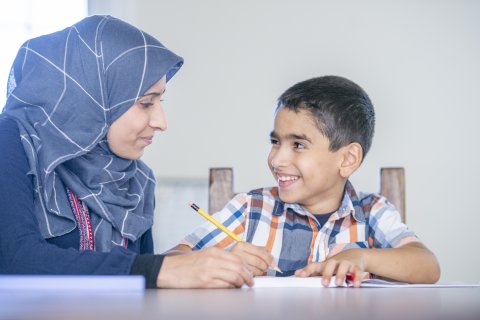Major grant for research on multilingualism in education
The researchers within the consortium Multilingual voices in STEM education have acquired a 1.6 million euro grant. The Netherlands Organisation for Scientific Research (NWO) has awarded the grant under the Dutch Research Agenda programme ‘Research along Routes by Consortia’ (NWA-ORC). The consortium leader is Elma Blom, Professor of Language Development and Multilingualism in Family and Educational Contexts at Utrecht University. Blom explains: 'We will research the different contexts in which children learn: so not only at school and at home, but also in science museums. Language may form a barrier to participation in education and to knowledge development, particularly if a child is not fully proficient in the Dutch language. How can we solve this problem?'

The Netherlands is a diverse and multilingual country, but too little attention is paid to multilingualism among children with a migration background. Blom says: 'These children are taught in Dutch, a language in which they are less proficient, while their native language knowledge and skills remain unutilised.' This clearly also affects their knowledge of school subjects such as mathematics, and education in science and technology. 'As a result, many multilingual children participate less successfully in education than their peers with a Dutch background.'
Buddies in museums
Blom asserts that the home languages of multilingual children are insufficiently utilised. 'In this new project we will develop multilingual strategies for learning mathematics, science and technology. These strategies will help parents, teachers and professionals in science museums to promote participation by multilingual children. This might include multilingual buddies in museums to assist children who are not yet fully proficient in the Dutch language. Buddies can explain the museum activities to these children in their native language.' Through their research the researchers not only aim to enable children to improve their performance, they hope that multilingual children will also experience greater inclusion.
It is quite comprehensive – we need the entire knowledge chain.
Large group
The list of cooperating bodies within the consortium is long. In response to why there are so many affiliated organisations, Blom says, in a nutshell: 'I simply cannot do it on my own. It is quite comprehensive – we need the entire knowledge chain. Broad collaboration is therefore required. In addition to research universities and universities of applied sciences, the affiliated organisations include school boards, various museums and parents’ organisations.'
Other projects
Utrecht University participates in several research projects that have successfully obtained funding. All projects awarded funding under this grant are listed on the NWO’s website.
participating organisations within the consortium
Utrecht University, HU Hogeschool (HU University of Applied Sciences), iPabo Amsterdam, CPS onderwijsontwikkeling en advies, Expertis, Expertisecentrum Nederlands, Malmö University, Stichting Leerplanontwikkeling SLO, Platform Talent voor Technologie, NEMO Science Museum, Museon, Teylers Museum, Spaarnesant, Voila, Wereldkidz, Zonova, Lund University Dept. of Clinical Sciences, Taal doet meer, Rutu foundation, It’s my child, Al-Amal, Joury, IOT, SARDES, Vereniging voor Science Centers, Lowan, NVORWO, SPRONG consortium, Science Hub Utrecht University, Yunus Emre, municipality of The Hague, Defence for Children.

